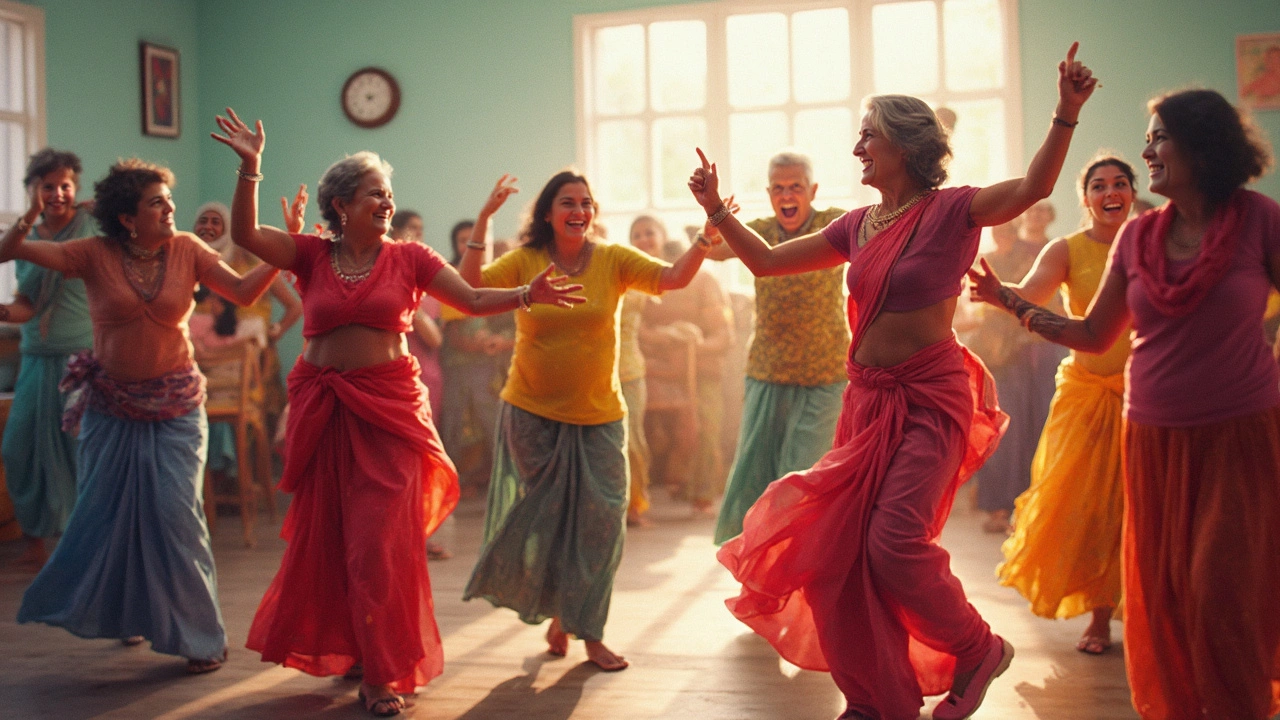Feeling like those pounds have glued themselves to you as you've hit the big 5-0? You're not alone. A lot of folks find it tougher to shed weight as they age, thanks to slower metabolism, hormonal changes, and maybe even a busier life. But don't worry, losing 20 pounds after 50 isn’t some impossible dream. It just takes the right game plan.
First up, let's talk about what's happening with your metabolism. As we age, our metabolism starts acting like an old engine that needs a bit more effort to rev up. This means your body burns calories slower than it used to, making it easier for weight to stick around. The trick is to tweak your lifestyle a bit—it's not about drastic changes but rather smart adjustments that make weight loss realistic and maintainable.
- Understanding Metabolism Changes
- Diet Tweaks That Make a Difference
- Exercise Tips for Fast Results
- Mindset and Motivation Boosts
- Get Support from Weight Loss Clinics
Understanding Metabolism Changes
So, what's actually up with your metabolism as you get older? Well, starting in your 30s, there's a gradual dip in the rate at which your body burns energy. By the time you're over 50, this slowdown can be pretty noticeable. That's partly due to a drop in muscle mass, which naturally burns more calories than fat even at rest.
If you're guilty of sticking to the same routine you had in your 20s or 30s, it might be time for a rethink. Preserved muscle mass is your best friend here. How? More muscle equals a faster metabolism. So, getting back some of that lean muscle through resistance training could seriously help you lose weight after 50.
Another thing to note is that hormonal changes can mess with metabolism. With age, your thyroid hormones, which are in charge of metabolism speed, might not function as efficiently. Also, a decline in testosterone (for men) and estrogen (for women) often affects how your body stores fat.
If you want to get specific, a study showed that from about 40 to 60 years old, your resting metabolic rate can decrease by roughly 2% per decade. That might not sound like much, but even a small change can add up over time, contributing to weight gain if your eating and exercise habits remain the same.
Here's a quick action plan: Keep an eye on muscle maintenance, check in with your doctor about hormone levels if you've noticed unexpected changes, and rethink your calorie intake. Adjusting your diet to match your body's needs post-50 can help manage these metabolism changes.
Diet Tweaks That Make a Difference
Changing up your diet can actually be simpler than you think, and a few smart tweaks can go a long way in helping you lose weight after 50. The key is focusing on nutrient density and controlling portions without it feeling like deprivation.
First, consider trimming down your carb intake. Now, this doesn't mean ditching all carbs but go easy on highly processed ones like white bread and cookies. Instead, pick whole grains that offer more fiber and keep you full longer.
Ample protein is your friend here, too. It helps build and maintain muscle mass, which naturally decreases with age but plays a huge role in boosting metabolism. Think lean meats, fish, and plant-based options like beans and lentils. Aim for about 25-30 grams of protein per meal to see the benefits.
Now, don't skip out on healthy fats; they aren't the enemy. Focus on fats from sources like avocados, nuts, and olive oil. These not only help in absorbing vitamins but also keep your hunger at bay.
Proper hydration is equally important. Sometimes our body confuses thirst with hunger, especially as we age. Make sure to drink plenty of water throughout the day to stay hydrated.
Here's a little trick: consider using a smaller plate for meals. It's a mind game, but it helps control your portion sizes and cuts down overeating without you even realizing it.
- Reduce processed carbs
- Boost protein intake
- Embrace healthy fats
- Stay hydrated
- Use smaller plates
For those looking into data, studies have shown that reducing calorie intake by just 500 calories a day can lead to losing about 1 pound a week. Here's a quick glance:
| Daily Calorie Reduction | Estimated Weight Loss Per Week |
|---|---|
| 500 calories | 1 pound |
| 750 calories | 1.5 pounds |
Making these diet tweaks can get those pounds moving in the right direction without turning your life upside down.

Exercise Tips for Fast Results
Alright, let’s get moving! If you’re hoping to lose weight after 50, tweaking your exercise routine could do wonders. It’s not about spending hours at the gym but rather making each workout count. The secret? Mix up your exercise with a blend of cardio, strength training, and flexibility exercises.
Cardio is your calorie-burning buddy. Think brisk walking, cycling, or even some light jogging. Aim for at least 150 minutes a week. Break it down into chunks that fit into your day—morning jogs, lunchtime power walks, you name it!
Now, strength training isn’t just for bodybuilders. It’s super important for those over 50 as it helps maintain muscle mass, which naturally dwindles with age, and boosts that sluggish metabolism. You don’t need fancy equipment to get started. Bodyweight exercises like squats, push-ups, or simple resistance bands can be your best pals.
- Squats: Great for legs and core; start with 10 reps and work your way up.
- Push-ups: Perfect for upper body strength; try doing them against a wall if full push-ups feel tricky.
- Resistance band exercises: These can target various muscles and are gentle on the joints.
Don’t skip on flexibility exercises either. Yoga or Pilates can improve your balance and keep you limber, which is key as you age. Plus, they’re fantastic for unwinding mentally.
If numbers motivate you, here’s a snapshot of potential calorie burns to give you an idea:
| Activity | Calories Burned per 30 minutes |
|---|---|
| Walking (brisk) | 150-200 |
| Cycling (moderate pace) | 250-300 |
| Yoga | 100-150 |
To wrap it up, remember to listen to your body and adjust your routine to how you’re feeling. The goal here is to keep it enjoyable and sustainable while seeing those weight loss results.
Mindset and Motivation Boosts
Alright, let’s face it. Losing weight after 50 can sometimes feel like a mental marathon. It's not just about what you eat or how often you exercise but also about keeping your head in the game. So, how can you stay motivated and keep your mindset strong while aiming to lose weight after 50? Let's dig in.
First off, set realistic goals. Instead of aiming for the sky right at the start, try breaking that 20 pounds down into smaller, manageable milestones. Reward yourself for these smaller successes—just not with a giant piece of cake, okay? Creating a sense of achievement helps keep you motivated in the long run.
Another powerful trick up your sleeve is building a support system. Surrounding yourself with friends or family who are on the same journey can make a huge difference. They’re there to cheer you on and keep you accountable. And don’t be shy about reaching out to professionals in weight loss clinics. They’re experts for a reason!
I can’t stress enough how important positive thinking is. A study from the National Institute on Aging suggests that people who keep a positive attitude tend to have better health outcomes, including weight loss. It’s not just about being optimistic; it’s about truly believing that you can do this. As the wise Henry Ford once said,
"Whether you think you can, or you think you can’t – you’re right."
Finally, keep track of your progress. Whether you're jotting down your weight in a journal or tracking calories with an app, seeing the progress on paper can be incredibly motivating. It gives you visual proof that your efforts are paying off.
So, there you have it: a few straightforward ways to boost your mindset and motivation on your path to losing those stubborn pounds. Remember, it's a journey, not a sprint. Stay consistent, and you’ll get there.

Get Support from Weight Loss Clinics
If shedding those stubborn pounds alone feels like climbing Mount Everest, getting a little help from specialized weight loss clinics might be your golden ticket. These clinics offer more than just a scale and a pamphlet. They're packed with tools, expert advice, and personalized plans that can make all the difference.
First off, these clinics often have professionals like dietitians, nutritionists, and fitness experts on tap, ready to guide you. Imagine having a whole team looking at what you eat, how you move, and customizing a weight loss strategy that's just right for your lifestyle and preferences.
What’s super handy is the access to medical assessments. Clinics can monitor your body’s response to new diets and exercise plans, checking vital stats like cholesterol and blood pressure to make sure you're losing weight safely.
Some clinics go a step further with behavioral therapy sessions. Changing habits can be tough, especially when you’re used to a certain routine. Behavior therapy helps tackle the psychological side of losing weight, giving you strategies to stick with your goals.
Another cool feature is their group sessions or support groups. Here, you'll find people just like you who are going through similar challenges. It's a great place to share your progress, tips, and even have a laugh or two. Plus, knowing you're not alone can be a major boost to your motivation.
To put a cherry on top, many clinics also offer state-of-the-art tech and treatments. Think innovative tools like body composition machines that give you a deeper understanding of where your weight loss stands, or the latest non-invasive procedures that can complement your efforts.
Whether it's a little nudge in the right direction or comprehensive help you need, weight loss clinics can provide the structured support that makes losing weight after 50 feel less like a mystery and more like a step-by-step journey.





